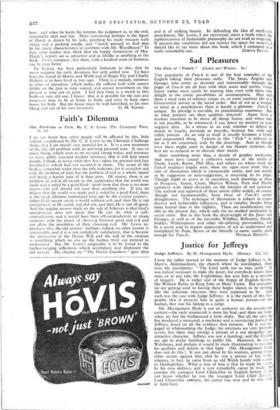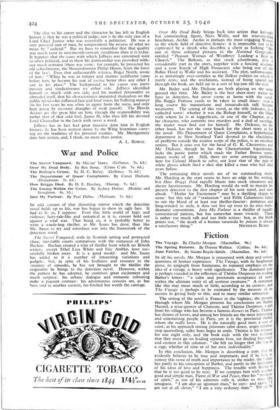Justice for Jeffreys
Judge Jeffreys. By H. Montgomery Hyde. (Harra2. 12s. 6d.) UPON the tablet erected to the memory of Judge Jeffreys in St. Mary's, Aldermanbury, the church where he worshipped, there runs the inscription: "The Lord seeth not as man seeth." It was indeed necessary to make the point; for everybody knows how man, or at any rate, the Englishman, has seen him as a monster of iniquity. He is rather one of the bogies of English history, like William Rufus or King John or Mary Tudor. But nowadays we are getting used to having these bogies shown to be nothing like the inhuman monsters they were supposed to be. And such was the case with Judge Jeffreys: it is the merit of this bio- graphy- that it presents him as quite a human person—all too human, that was his failing as a judge.
Mr. Montgomery Hyde is not an authority on the seventeenth century—the early nineteenth is more his beat, and there are times when we feel the background a little shaky. But all the same he has produced a measured, a moderate and a convincing portrait of Jeffreys, based on all the evidence that remains. He is not en- gaged in whitewashing the Judge; his strictures are very properly severe; but there. does emerge a picture of a not altogether un- attractive character. Jeffreys was not a humbug; and the English are apt to prefer humbugs in public life. Moreover, he wis a Welshman, and perhaps it would be more illuminating to examine his qualities and defects in that light. (Mr. Montgomery Hyde does not do this.) It was put about by his enemies, among many other counts against him, that he was a person of low birth; whereas, in fact, he came from an old Welsh family with estates in Denbighshire. What is true of him is that he made his career by his own abilities; and a very remarkable career he made: he remains the youngest Lord Chancellor in English history (I. do, not know whether he was the youngest Lord Chief Justice). Lord Chancellor atasforty, his career was over and he was (lead at forty-four. The clue to his career and the character he has left in English history is that he was a political judge; nor is he the only case of a Lord Chief Justice who was essentially a politician. He was a very personal sort of man, by temperament the reverse of What we mean by "judicial." But we have to remember that that quality was much rarer in seventeenth-century conditions than it is today. It happens that the cases with which Jeffreys was concerned were so often political, and in them his partisanship was provoked with- out much restraint (there was some : for example, he protected his old schoolmaster, the Nonconformist Philip Henry, from the force of the law). Even that unfavourable witness, Roger North, wrote of him : " When he was in temper and matters indifferent came before him, he became his seat of justice better than any other I saw in his place." The background to his career was party passion and vindictiveness on either' side. Jeffreys identified himself so much with one side, and his marked personality so obtruded itself, that his characteristics imprinted themselves on the public mind—his inflamed face and loud voice, his bullying manner (in his last years he was often in agony from the stone, and only kept going by constant draughts of weak punch). The Bloody Assizes are the great blot on him, though the responsibility was rather that of that cold fool, James II, who then left his devoted Lord Chancellor in the lurch with never a word.
Jeffreys has in fact had great injustice done him in English history; he has been written down by the Whig historians carry- ing on the tradition of his personal enemies. Mr. Montgomery does him justice, and, I think, no more than justice.
A. L. ROWSE.



























 Previous page
Previous page